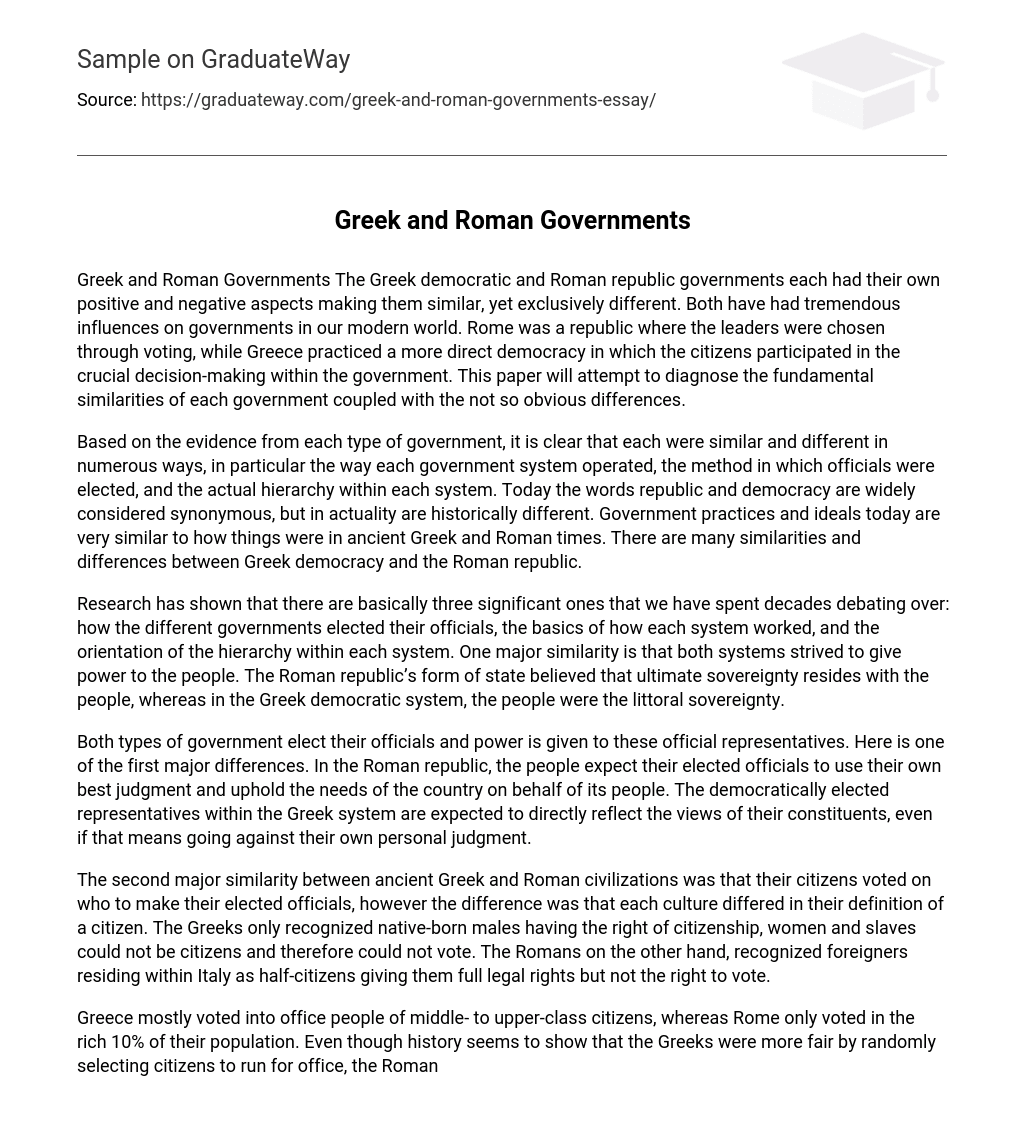Both the Greek democratic and Roman republic governments share similarities and differences that make them unique. They have both had a significant impact on modern governments. In Rome, leaders were selected through voting, while in Greece, citizens directly participated in government decision-making. This essay aims to explore the fundamental similarities and less evident differences between these two governments.
The evidence from each type of government shows that they were both similar and different in several ways. This includes the functioning of the government system, the method used to elect officials, and the hierarchical structure within each system. Although nowadays the terms republic and democracy are often used interchangeably, historically they have distinct meanings. The practices and ideals of modern governments bear resemblance to those of ancient Greece and Rome. Hence, there exist numerous similarities and differences between Greek democracy and the Roman republic.
Extensive debate has surrounded three key factors in research for decades: the electoral processes of different governments, the fundamental principles of each system, and the hierarchical structure within each system. It is noteworthy that both systems sought to empower the people. In the Roman republic, ultimate sovereignty was believed to reside with the people, whereas in the Greek democratic system, limited sovereignty was held by the people.
Both the Roman republic and Greek system have elected officials with power, but they differ in their approach. In the Roman republic, officials are expected to prioritize the nation’s interests and use their own judgment for the benefit of its people. On the other hand, in the Greek system, representatives are democratically elected to directly represent their constituents’ opinions, even if it conflicts with their personal judgments.
Both ancient Greek and Roman civilizations shared a common practice of their citizens engaging in voting for elected officials. Nevertheless, there existed a notable distinction between the two cultures concerning the concept of citizenship. In Greek society, solely male individuals born within the country were acknowledged as citizens and possessed the right to vote, whereas women and slaves were excluded from this status. Conversely, Romans regarded foreigners living in Italy as semi-citizens, affording them complete legal rights but withholding their voting privileges.
Greece elected individuals from the middle to upper-class, while Rome only elected the wealthy 10% of their population. Although history suggests that the Greeks were more equitable by randomly selecting citizens for office, the Roman government specifically selected their candidates, similar to the contemporary political system where the Republican and Democratic parties choose their nominees. The third similarity/discrepancy between these two societies lies in their hierarchy.
In Greece, due to their small population, they were able to implement a direct democracy where citizens actively participated in politics, avoiding the need for representatives. Conversely, the Romans operated under a representative democracy where two consuls were elected as heads of state. These elected consuls held veto power over each other and served one-year terms. Below them, the Roman Senate comprised 300 men, typically consisting of the wealthiest 10%.
While Greece elected their citizens to serve on the Athenian Assembly and the Council of Five Hundred, which advised the assembly and created laws, Rome had a distinct style of government. Unlike Greece, Rome did not want power concentrated in one individual making all the laws. Instead, they implemented a three branch system similar to our own: an executive branch, a legislative branch, and a judicial branch.
In summary, the Roman government was a fascinating combination of democracy and republic. The Ancient Greeks greatly influenced their views on governance, which we have also adopted into our American democratic system. As Americans, we can express gratitude to both Rome and Greece for our government’s structure.
References
- Fiero, G. K. (2006). The Humanistic Tradition (5th ed. ). New York, New York: McGraw Hill.
- The College of New Rochelle. (2003). Roman Government. Retrieved from http://www. vroma. org/~bmcmanus/romangvt. html





